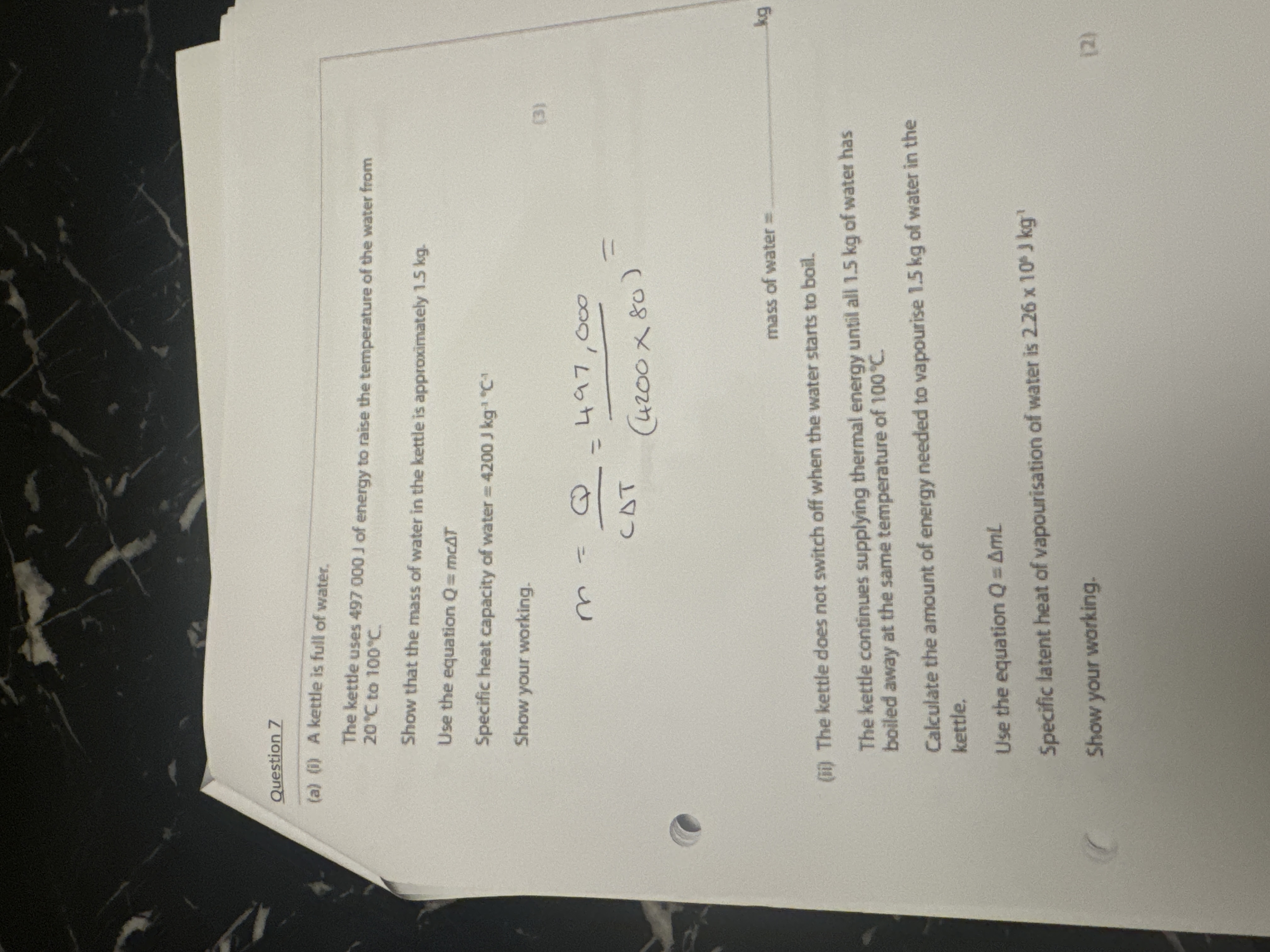A kettle is full of water. The kettle uses 497000 J of energy to raise the temperature of the water from 20°C to 100°C. Show that the mass of water in the kettle is approximately 1... A kettle is full of water. The kettle uses 497000 J of energy to raise the temperature of the water from 20°C to 100°C. Show that the mass of water in the kettle is approximately 1.5 kg. Use the equation Q = mcΔT. Specific heat capacity of water = 4200 J kg^-1 °C^-1. Show your working. The kettle does not switch off when the water starts to boil. The kettle continues supplying thermal energy until all 1.5 kg of water has boiled away at the same temperature of 100°C. Calculate the amount of energy needed to vaporise 1.5 kg of water in the kettle. Use the equation Q = ΔmL. Specific latent heat of vaporisation of water is 2.26 x 10^6 J kg^-1. Show your working.

Understand the Problem
The question asks to calculate the mass of water in a kettle based on the energy used to heat it using the formula Q = mcΔT, and then it asks for the energy needed to vaporize that mass of water using Q = ΔmL.
Answer
The mass of water is approximately 1.5 kg, and the energy needed to vaporise 1.5 kg of water is $3.39 \times 10^{6}$ J.
Answer for screen readers
The mass of water in the kettle is approximately 1.5 kg, and the energy needed to vaporise it is $3.39 \times 10^{6}$ J.
Steps to Solve
- Identify Known Values
From the problem, we have:
- Total energy (Q) = 497,000 J
- Specific heat capacity of water (c) = 4200 J kg$^{-1}$ °C$^{-1}$
- Temperature change (ΔT) = $100°C - 20°C = 80°C$
- Use the Formula for Mass
Using the formula ( Q = mcΔT ):
Rearranging it to find mass (m):
$$ m = \frac{Q}{c \Delta T} $$
Substituting the known values:
$$ m = \frac{497000 \text{ J}}{4200 \text{ J kg}^{-1} °C^{-1} \times 80 \text{ °C}} $$
- Calculate the Mass
Calculating the denominator:
$$ 4200 \text{ J kg}^{-1} °C^{-1} \times 80 \text{ °C} = 336000 \text{ J kg}^{-1} $$
Now substituting back to find m:
$$ m = \frac{497000 \text{ J}}{336000 \text{ J kg}^{-1}} \approx 1.477 \text{ kg} $$
This approximates to 1.5 kg.
- Calculate Energy Needed to Vaporise Water
Using the formula ( Q = \Delta m L ), where:
- $\Delta m = 1.5$ kg (mass of water)
- Latent heat of vaporisation (L) = $2.26 \times 10^{6}$ J kg$^{-1}$
Substituting these values into the formula:
$$ Q = 1.5 \text{ kg} \times 2.26 \times 10^{6} \text{ J kg}^{-1} $$
- Calculate the Energy for Vaporisation
Calculating the energy:
$$ Q = 3.39 \times 10^{6} \text{ J} $$
The mass of water in the kettle is approximately 1.5 kg, and the energy needed to vaporise it is $3.39 \times 10^{6}$ J.
More Information
The specific heat capacity of water means it requires a significant amount of energy to raise its temperature, which is why heating it takes time. Additionally, the energy required to change water from liquid to gas (vaporization) is much higher than merely heating it up.
Tips
- Confusing the specific heat capacity with the latent heat of vaporisation; they are used in different contexts.
- Forgetting to convert temperature changes from Celsius to Kelvin is unnecessary in this case, as the difference remains the same.
AI-generated content may contain errors. Please verify critical information